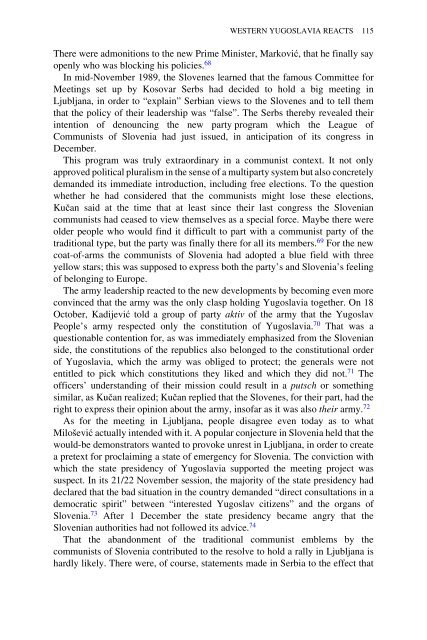Yugoslavia: A History of its Demise - Indymedia
Yugoslavia: A History of its Demise - Indymedia
Yugoslavia: A History of its Demise - Indymedia
You also want an ePaper? Increase the reach of your titles
YUMPU automatically turns print PDFs into web optimized ePapers that Google loves.
WESTERN YUGOSLAVIA REACTS 115<br />
There were admonitions to the new Prime Minister, Marković, that he finally say<br />
openly who was blocking his policies. 68<br />
In mid-November 1989, the Slovenes learned that the famous Committee for<br />
Meetings set up by Kosovar Serbs had decided to hold a big meeting in<br />
Ljubljana, in order to “explain” Serbian views to the Slovenes and to tell them<br />
that the policy <strong>of</strong> their leadership was “false”. The Serbs thereby revealed their<br />
intention <strong>of</strong> denouncing the new party program which the League <strong>of</strong><br />
Communists <strong>of</strong> Slovenia had just issued, in anticipation <strong>of</strong> <strong>its</strong> congress in<br />
December.<br />
This program was truly extraordinary in a communist context. It not only<br />
approved political pluralism in the sense <strong>of</strong> a multiparty system but also concretely<br />
demanded <strong>its</strong> immediate introduction, including free elections. To the question<br />
whether he had considered that the communists might lose these elections,<br />
Kučan said at the time that at least since their last congress the Slovenian<br />
communists had ceased to view themselves as a special force. Maybe there were<br />
older people who would find it difficult to part with a communist party <strong>of</strong> the<br />
traditional type, but the party was finally there for all <strong>its</strong> members. 69 For the new<br />
coat-<strong>of</strong>-arms the communists <strong>of</strong> Slovenia had adopted a blue field with three<br />
yellow stars; this was supposed to express both the party’s and Slovenia’s feeling<br />
<strong>of</strong> belonging to Europe.<br />
The army leadership reacted to the new developments by becoming even more<br />
convinced that the army was the only clasp holding <strong>Yugoslavia</strong> together. On 18<br />
October, Kadijević told a group <strong>of</strong> party aktiv <strong>of</strong> the army that the Yugoslav<br />
People’s army respected only the constitution <strong>of</strong> <strong>Yugoslavia</strong>. 70 That was a<br />
questionable contention for, as was immediately emphasized from the Slovenian<br />
side, the constitutions <strong>of</strong> the republics also belonged to the constitutional order<br />
<strong>of</strong> <strong>Yugoslavia</strong>, which the army was obliged to protect; the generals were not<br />
entitled to pick which constitutions they liked and which they did not. 71 The<br />
<strong>of</strong>ficers’ understanding <strong>of</strong> their mission could result in a putsch or something<br />
similar, as Kučan realized; Kučan replied that the Slovenes, for their part, had the<br />
right to express their opinion about the army, ins<strong>of</strong>ar as it was also their army. 72<br />
As for the meeting in Ljubljana, people disagree even today as to what<br />
Milošević actually intended with it. A popular conjecture in Slovenia held that the<br />
would-be demonstrators wanted to provoke unrest in Ljubljana, in order to create<br />
a pretext for proclaiming a state <strong>of</strong> emergency for Slovenia. The conviction with<br />
which the state presidency <strong>of</strong> <strong>Yugoslavia</strong> supported the meeting project was<br />
suspect. In <strong>its</strong> 21/22 November session, the majority <strong>of</strong> the state presidency had<br />
declared that the bad situation in the country demanded “direct consultations in a<br />
democratic spirit” between “interested Yugoslav citizens” and the organs <strong>of</strong><br />
Slovenia. 73 After 1 December the state presidency became angry that the<br />
Slovenian authorities had not followed <strong>its</strong> advice. 74<br />
That the abandonment <strong>of</strong> the traditional communist emblems by the<br />
communists <strong>of</strong> Slovenia contributed to the resolve to hold a rally in Ljubljana is<br />
hardly likely. There were, <strong>of</strong> course, statements made in Serbia to the effect that
















